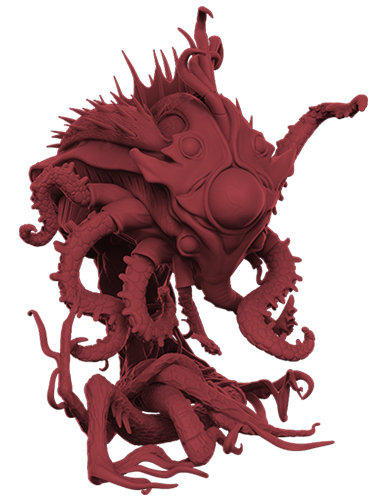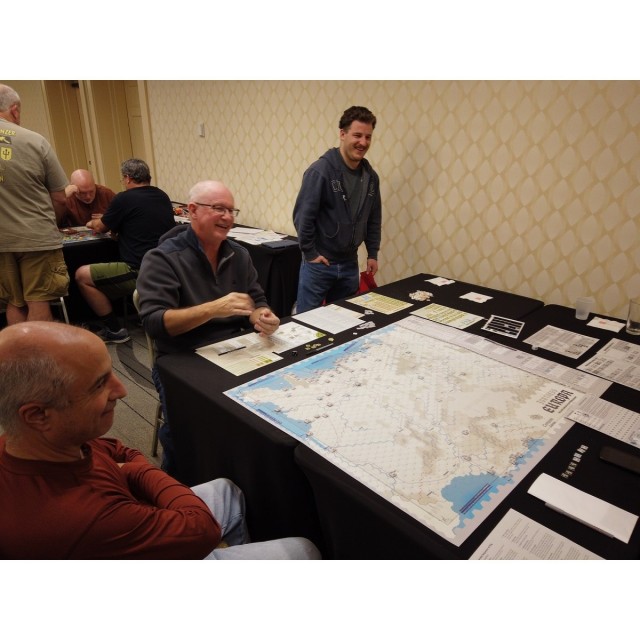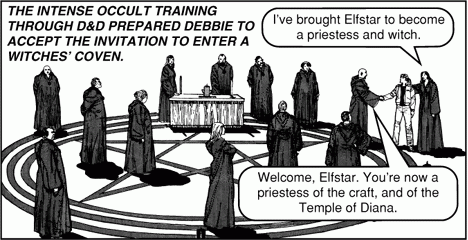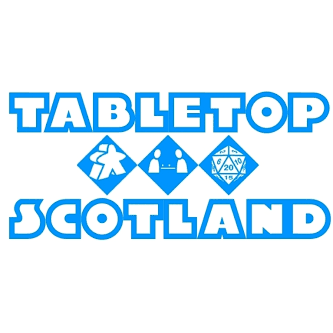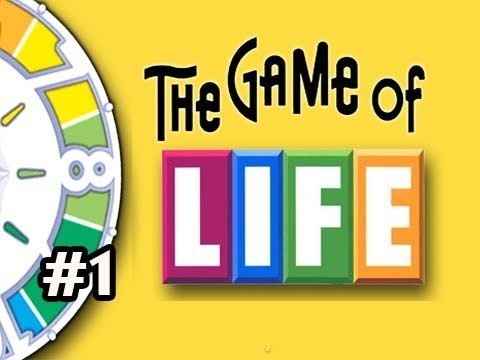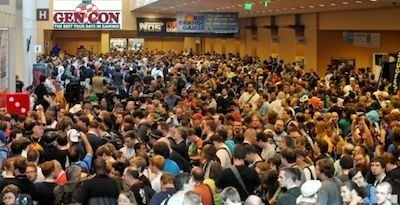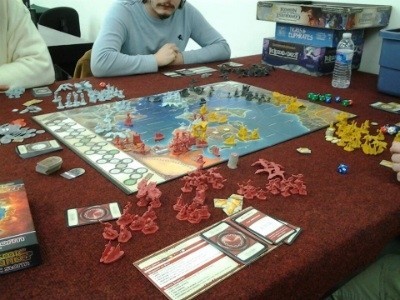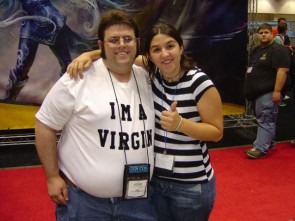Conventions. The smells of body odor, fried food, the sounds of box farts, cards shuffling, and heated discussions about who was hotter, Princess Leia or Amidala. People complaining that 7XL was the largest t-shirt available (yes I witnessed that) and all the geek ego stroking you can imagine. You wanna hear about my character? My deck? My greatest 18XX triumph? Fat women in tight leather asking if M'lord would like to demo their new CCG, stormtroopers waiting in line behind Klingons to take a piss. More Mountain Dew Code Red sold in one day than is sold the other 364 days of the year. For some, this would be a scary sight or something to make a documentary about. For me, it was a chance to play a whole lot of games in one day and hopefully see a bunch of new stuff.
 The first new (to me anyway) game that I got to play was Steam, Rags to Riches. We waited about an hour to play this, as a family with little kids was demoing it when we walked up to the Mayfair booth. This was OK as it gave me time to walk around the dealer hall and check out some of the deals, dice booths, and crazy people that were hanging out in there. Why the heck was a family with little kids playing a complex economic train game, might you ask? Well, this is a lesson that I hope Mayfair learns from in the future. They were running a promotion where if you demoed enough games they would give you a free game. Each game you demoed got you a catan resource, like wood, sheep, ore, etc. Different combinations got you different free games. Well, someone had the bright idea that playing Steam should be the only way to get ore. So, if the free game you wanted required ore, you had to demo steam. This led to a bunch of people with no interest in the game sitting through the demo while obese middle aged martin wallace fanboys lurked around the table like vultures. We stopped by and talked to the guy running the game (whose name I forget, but he was a great guy) and then left. When we came back in half an hour to see where the happy family was in their demo, there were half a dozen lurkers hanging about. When the family got up, I we had to do the "we were here first" "no you weren't" "yeah we were it was before you showed up" routine. Luckily the demo guy was paying attention and backed me up. Hopefully Mayfair learns from this and makes sure there is an alternate way to get ore next year!
The first new (to me anyway) game that I got to play was Steam, Rags to Riches. We waited about an hour to play this, as a family with little kids was demoing it when we walked up to the Mayfair booth. This was OK as it gave me time to walk around the dealer hall and check out some of the deals, dice booths, and crazy people that were hanging out in there. Why the heck was a family with little kids playing a complex economic train game, might you ask? Well, this is a lesson that I hope Mayfair learns from in the future. They were running a promotion where if you demoed enough games they would give you a free game. Each game you demoed got you a catan resource, like wood, sheep, ore, etc. Different combinations got you different free games. Well, someone had the bright idea that playing Steam should be the only way to get ore. So, if the free game you wanted required ore, you had to demo steam. This led to a bunch of people with no interest in the game sitting through the demo while obese middle aged martin wallace fanboys lurked around the table like vultures. We stopped by and talked to the guy running the game (whose name I forget, but he was a great guy) and then left. When we came back in half an hour to see where the happy family was in their demo, there were half a dozen lurkers hanging about. When the family got up, I we had to do the "we were here first" "no you weren't" "yeah we were it was before you showed up" routine. Luckily the demo guy was paying attention and backed me up. Hopefully Mayfair learns from this and makes sure there is an alternate way to get ore next year!
Anyway, on to my review of the game. Railroad Tycoon never really excited me, but some of Wallace's more recent train games were pretty fun, like Steel Driver and Railways of England and Wales. Plus I have always been curious about Age of Steam so I wanted to Steam a go.
Steam is very good. After designing roughly 582 train games in the last ten years or so, Wallace has brought a lot of the good stuff together in one game and culled out a lot of the crap. Steam doesn't have the stupid cards from RRT, and the board is far more balanced, which eliminates the need to play sheriff on the leader that you have in RRT. Steam also doesn't have the make-a-mistake-on-the-first-turn-and-lose cash system that exists in Age of Steam, although you can play Steam's advanced rules for a slightly more cutthroat exercise. The components in Steam are weak, using wooden discs where train-meeples would have been better and tiny cardboard money chits where something bigger or more easily stackable would have been nice. The design is really tight and fun. Each player represents a railroad, building links between cities and shipping goods between the cities to earn points which can be spent on either income or VPs. Of course, you have to borrow money (reducing your income) to pay for track early in the game, so a lot of your thinking goes into how to create a viable network of lines you can use to ship cubes as far as possible, to get your income up to a sustainable rate, then you shift to scoring VPs while trying to maintain the viability of your network. There are some variable player power roles that are selected, with different abilities like choose role first next turn, increase engine, re-seed city with goods, urbanize town to city, first to lay track, first to ship cubes, and build an extra track. You no longer auction any of this stuff, the turn order is handled entirely with the role selection. Despite my general dislike for role selection when it dominates a game, like in Puerto Rico and its many knockoffs, it really fades into the background in Steam and just functions to make the turn order work correctly instead of dominating the action.
Steam isn't all that different from Martin Wallace's other fifty train designs. Why do I like it when I am lukewarm on several of the others? I think with this one he hit a sweetspot on complexity. The difficulty of the game reminds me of Power Grid. There are a good bit of rules with a lot going on, but the game is inherently intuitive. On the second turn you realize what you are supposed to do and how you are supposed to do it, just like Power Grid. I think this factor, combined with the previous success of RRT and AoS, means that Steam is going to be a big hit for Wallace. My only complaints about steam are the components, which are nice but are in the abstract euro-style of discs and cubes where train meeples or plastic would have been great and the lack of a stock system optional rule. After playing Steel Driver and Rails of England, two Martin Wallace designs with brilliant stock rules resembling 18XX light, I was hoping to see optional stock rules in Steam. I guess not.

After we finished playing Steam, I mentioned to my friend Kris that I thoroughly enjoyed the game, but wished it had train meeples (anything but those boring discs) and a stock system, to which he replied, "have you played Chicago Express?" One of the nice things about Origins is that the Columbus Area Boardgame Society has a fantastic library of games. We went upstairs, checked out Chicago Express, and got going.
It was around this time that Steve Avery and Chris Moore (The King in Yellow) stopped by and said hi to me. I meant to catch up with them later and try to play a game but it didn't work out. Still very cool to meet these guys in person! Hopefully next year I can stay longer and actually play a game or two with them.
Anyway, I liked Chicago Express but it doesn't rank up there with Steam or many other train games. CEx uses a stock system, similar to 18XX or imperial, and the companies increase their profit through laying tracks. Unlike Steam which uses shipping goods to generate income, in CEx, each space on the board is simply worth a boost to your income or not. You can also build houses along your route for extra income.
Compared to the rich decision making involved with planning to ship goods in Steam, where you have to worry about what you are shipping, where you are shipping it to, and who might steal it from you, CEx's system is easy to the point of being boring. Pick a good route to a income-rich final destination like chicago, detroit, or pittsburgh and you are set. The game is ultimately pretty frustrating because of a balance issue. The good railroads get more shares sold in them, either by folks hoping to pick up a valuable share or people hoping to devalue the leader's shares. This results in an odd situation where a viable strategy is owning one share in two or three poorly ran railroads rather than three shares in the best railroad. That little quirk combined with the bland gameplay on the main board left me feeling pretty lukewarm on this one. In it's favor, Chicago Express plays in about 45 minutes, which is really fast for a stock based railroad game. If you are a train gamer and you are looking for a game that fits in a smaller timeframe, it might be worth looking at. Generally, I can't recommend it very strongly, but it does have wooden train meeples which beat the pants off wooden discs.

I also got to play four turns of Z-man's tales of the arabian nights. I don't want to pass judgment on a game after only playing four turns as opposed to a whole game, but this one is going to be a "love it or hate it" game for nearly everyone that plays it. Here is a summary of the gameplay: Move your player piece, execute a story encounter using the books and charts. This is done by cross referencing some die rolls with a choice you make. For example, you roll a die and another player will say "you encounter a hungry hag. What do you do?" Your choices might include feed, beat, coerce, seduce, rob, bribe, etc. It is different depending on the encounter. Based on what you do and what skills your character possesses, the other player then cross references a table and reads a paragraph from the book. It is basically a huge (and I do mean huge, over 3000 paragraphs of text) choose your own adventure story with a skill and victory point system tacked on. If you think that sounds like fun, then you will love this. I didn't feel very "in control" of my own destiny, as it all feels pretty random. As I said above, this is a game you will either love or hate. You certainly aren't going to play it competitively, because although it is a great experience, it is thoroughly random. I liked it as an experience but I am unsure how I feel about it as a game.

Finally, I played a lot of random prototypes. The majority of these I was sworn to complete secrecy on. One was designed by a gentleman whose face would appear on the Ameritrash designer Mount Rushmore, a true elder statesman amongst A-T designers, but due to its original theme and a couple very innovative mechanics I was sworn to total secrecy. I just want to say that when it comes out, if they get rid of a couple little horrific issues, it will become an instant ameritrash classic. I feel like a dick talking about it without being able to ACTUALLY say anything, but this is a report on prototypes and demos, so you will have to get over it. Plus I dropped some clues.
The only prototype I played where the designer was happy to allow me to review it was Christian Leonhard and Jason Matthews' Campaign Manager 2008. This game is set to be released by Z-Man in late 2009. It is a card game based on the 2008 preseidential elections. It uses a system of political support, issues, and demographics with a cool CCG-esque card drafting mechanism to do a light simulation of the 2008 presidential campaign that plays very fast. I was blown away and truly impressed by this game. Easily the highlight of the convention for me. I am pretty indifferent on 1960. I think it isn't complex enough to really be that interesting, all the battles are centered around a few key states, and there are certain strategies that win every time. When I heard they were doing a lighter card game version of 1960 based on the 2008 election I was not all that excited. Sounded pretty blah to me. I was very wrong. CM08 solves the problems that 1960 had and presented a much more streamlined game which plays very fast.
Here is a rundown of the gameplay. Each state is represented by a card which contains two political support tracks (one for each issue, economy and foreign policy), a issue track (which determines which issue matters), and a demographic track (Reagan democrats, college voters, hispanics, etc.). Each side gets a deck of cards which manipulates these different tracks. Anyone who fills up the support track for the winning issue with their tokens wins the state. Each state starts with certain levels of support for the two candidates based on how they are leaning. The demographics come in through card text, which might say "all undecided women voters become obama supporters" or something like that. The other cards manipulate the key issue, or add support in an area, or do other things. Additionally, there is an event deck. One event happens each time a state is won. Other cards available to the players have other interesting effects. Some require a roll on the dirty politics table (the only table involved in the game) others are media support cards which have certain effects and remain in play. Each state, depending on it's size, grants a certain number of electoral votes and the two sides race to the required number to win.
My favorite thing about the game is that it actually captures what Dominion failed to do: You truly build your own deck at the beginning of the game. The game comes with 45 cards for each side, but the game is only played with 15 cards to a side. At the beginning, you draw three and choose one to keep and repeat until your deck is built. This allows a LOT of leeway in pursuing different strategies. For example, when the game was explained to us by Christian, I heard him say that Obama has a slight advantage in most states on the economy issue. Thinking back to my CCG days, I decided to try to build a control style deck, and I concentrated on cards that kept all of the states concentrated on the economy instead of foreign policy. I hoped to negate McCain's advantage in foreign policy states and make the cards in my opponent's deck which added foreign policy support worthless to him. My opponent played a more balanced deck, as he tried to incorporate as many "and draw a card" effects as possible to create a hand advantage. My Obama control deck concept ultimately failed because I didn't incorporate enough support granting cards and slowly McCain was able to establish himself on the economy issue. He also won a couple of big states out of the gate before I could establish my economy issue lockdown.
Why does this little deckbuilding thing excite me so much? Because for a really simple quick game, there is a lot of replayability. You can build a deck around getting undecided voters through the demographic mechanics, you can build an issue control deck, you can build a support based deck, or a deck around dirty politics cards. Heck, when my issue control deck began stalling out, and I realized I was having trouble laying down enough support to win, I switched gears and started abusing one of the only non-issue manipulating cards I had included in my deck: Keith Olberman Obama Bromance! AKA Left wing media. That card allowed me to choose the effect of the event from the event deck instead of it effecting the new state that came out. I started choosing small, easy to control states so that no matter who won their votes, I would get to choose the effect of the event we drew through my left wing media. Don't worry, there is a right wing media card to balance this effect. Most of the cards you might interpret as "taking a shot" at a candidate had a counterpart on the other side. The entire card set was very tastefully done from a standpoint of political balance.
I felt 1960 was overwrought for a game that truly wasn't very deep. Great for the first couple of plays, then you were asking yourself why it took an hour to decide who got New York. However, when you take a similar (but stripped down) system and turn it into a 20-30 minute card game, and you tack on a nifty little deckbuilding mechanism that adds a ton of replayability into the system, I think they have a winner. Plus Z-Man will undoubtedly produce it with nice bits, and if it is cheap, I can see this being one of the best reviewed short 2 player games ever. I am that impressed with it. Not that there are a lot of short 2 player gamer's games out there anyway to be honest. Look for this game in fall of 2009.
I didn't get a chance to play Jason and Christian's founding fathers game, which they also had on hand. Origins, even with my one day speed gaming experience, was a lot of fun. So who is going to be at Gencon?
 Games
Games How to resolve AdBlock issue?
How to resolve AdBlock issue? 

